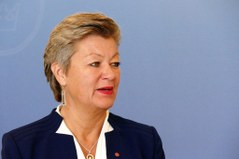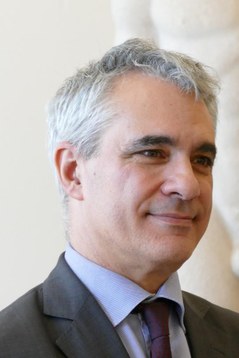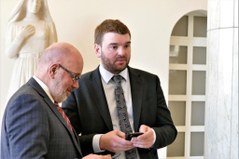Nordic region strengthens cooperation against work-related crime – wants EU onboard
It is called the grey economy, social dumping, work-related crime – yet despite the many names the problems are common and concern all of the Nordic region and Europe. This is about criminal networks, pure exploitation of labour, businesses operating on the edge of the law and unequal competition. All this led to a joint resolution at the ministers’ meeting in Stockholm on 13 April.
“The resolution alone has no effect of course, but a joint Nordic decision does have an effect, and the resolution is an expression of that joint decision,” says Ylva Johansson, Sweden’s Minster for Employment and Integration, who hosted the Nordic Council of Ministers’ meeting where government ministers from all of the five Nordic countries gave the decision their unconditional support.
The minsters’ agenda also included a debate on the integration of immigrant women into the labour market, and an informal conversation about #metoo.
 Ylva Johansson has often said that Sweden can learn from the way Norway has organised its fight against work-related crime. Now she had invited Trude Vollheim, Director General of the Norwegian Labour Inspection Authority, to present an overarching introduction about the work based on her experiences from working with taxation and labour market issues.
Ylva Johansson has often said that Sweden can learn from the way Norway has organised its fight against work-related crime. Now she had invited Trude Vollheim, Director General of the Norwegian Labour Inspection Authority, to present an overarching introduction about the work based on her experiences from working with taxation and labour market issues.
Trude Vollheim did not shy away from talking about how challenging this work is both on a national and international level, and how necessary it is to have cooperation between authorities and across borders in order to stop things getting out of control. She described today’s situation based on an analysis made by The national intergovernmental analysis and intelligence centre NTAES in 2017.
“Work-related crime is a large and demanding challenge for the Norwegian labour market; for the social partners, the authorities and for businesses. We see that this is becoming an increasingly complex area where criminals develop new methods as soon as they see an opportunity to make a profit, and they adapt their methods in response to the authorities’ controls.
“Their work is often organised by shadow operators and complex networks of players. The criminals follow the money and operate across borders – whether these are national or municipal ones. Some crimes also cross different authorities’ areas of responsibility, which makes them dependent on each other when fighting this kind of crime.”

Example of criminal networks in the labour market (source: The Work Environment Agency)
Norway has long traditions for intergovernmental cooperation in the fight against work-related crime. The Labour Inspectorate, the Tax Administration, NAV, and the police work together in seven centres around the country to combat work-related crime. In other parts of the country where they are not gathered in a centre, they meet regularly. According to Trude Vollheim, this cooperation means each authority uncover more cases of crime than they would have done if working in isolation.
 "This is about serious breaches of the Working Environment Act, the exploitation and use of illegal labour, bankruptcy fraud and working environment crime. Criminal networks and strawmen operate across different trades and sectors, and have spread to more trades than before. These are players, not businesses,” underlined Trude Vollheim, who also pointed to a new trend of people using sole trader companies in order to avoid employer’s responsibilities and minimum wage regulations.
"This is about serious breaches of the Working Environment Act, the exploitation and use of illegal labour, bankruptcy fraud and working environment crime. Criminal networks and strawmen operate across different trades and sectors, and have spread to more trades than before. These are players, not businesses,” underlined Trude Vollheim, who also pointed to a new trend of people using sole trader companies in order to avoid employer’s responsibilities and minimum wage regulations.
“We see businesses with complex company structures, which are particularly adept at circumventing regulations. They adapt to the authorities’ demands by falsifying documents to make them look real, and by camouflaging their illegal operation by making parts of it appear legal. This mixture of legal and illegal operations makes it difficult to detect. An increasing number of criminals get professional help from lawyers, accountants and consultants.
“The challenge authorities have is how to detect this and then prove what has happened and document the issues.”
According to Trude Vollheim this is a race to develop new methods.
“We have to stay ahead of the game,” she says.
Time is also of the essence when it comes to sentencing. Rapid reactions are important to prevent players disappearing before authorities have a chance to apprehend them, or to make sure they do not do too much damage before being punished.
“Charges and punishment are not always the most efficient tools in the fight against work-related crime, but it is of course important to take certain cases through the courts. Other methods might be more suitable, like rapid sanctions through bureaucratic channels, fines and the seizing of equipment.”
A concrete debate
“We got a very concrete debate between ministers, inspired by Trude Vollheim. It was more concrete than what we are used to from our political debates,” Ylva Johansson told the Nordic Labour Journal.
“We obviously share many things both in terms of the problems we face, the way in which things are escalating and moving to new sectors, but also how much we have in common when it comes to which measures we have been implementing. We can clearly learn from each country’s measures and cooperate on this,” she said.
“We will follow up this field during the Presidency programme with an expert meeting in August, where experts from the Nordic countries and the Baltics will attend together with the social partners. I hope we will then see concrete results and improvements as a result of the Swedish Presidency.”
Trude Vollheim also underlined the importance of international cooperation. Norway has cooperation agreements with authorities in Lithuania, Bulgaria, Poland and Estonia. Romania is next. Several Nordic countries, including Denmark, have also entered into bilateral agreements with one or several countries
A joint resolution
The joint resolution which was adapted at the ministers’ meeting addresses the specific conditions in the Nordic labour markets and the measures against work-related crime. The aim is to secure just working conditions and fair competition. The resolution will be presented to the EU Commission.
“This is also work which is being carried out inside the EU. It is often the case that work-related crime involves players from other EU countries who are exploiting the free movement of labour, which can allow them to go under the radar when it comes to crime. So these are important issues for the European cooperation. It is also important to highlight our joint standpoint and our joint decisions on these issues,” said Ylva Johansson.
She felt the good reception she got from her ministerial colleagues for raising these questions during the Presidency, means we could also be seeing some effects from this.
There was clear engagement in the debate between colleagues both from the Nordic countries and the autonomous areas. The Faroe Islands representative, Director of Cabinet AffairsRúni Joensen, pointed out that this is an area over which the autonomous government does not have all the control.
Labour inspection and taxation belongs to the autonomous authority’s responsibilities, while the police is controlled from Denmark. This is a problem when it comes to coordinating measures between government offices. At the same time, he underlines how useful the debate is.
“What is happening in the Nordic region will sooner or later arrive in the Faroe Islands.”
Head of department Jakob Jensen from Denmark’s Ministry of Employment, said he recognised the picture presented by Trude Vollheim, and on behalf of his government minister he expressed how useful the joint resolution agreed by the Nordic countries was.
Finland has also been working with different strategies for fighting work-related crime. They have found systems that work, particularly for the construction trade. Finland’s Minister of Labour Jari Lindström underlined the importance of cooperating with the social partners in this area, and added:
“We think the Nordic cooperation works very well. If it also works on a European level, we get an even better cooperation. By working together we can defend the Nordic labour markets’ position.”
Tripartite cooperation is the jewel in the crown
“The tripartite cooperation is the jewel in the crown for the Nordic countries, where authorities and the partners work together in order to find good solutions. The Norwegian rules have been developed together with the partners to make sure they remain relevant,” said Anniken Hauglie from Norway, who also praised the Swedish Presidency for putting the issue on the agenda.
“This is an area which has been a priority for Norway over many years. We think it is important to bring it onto the agenda here, because it is very clear that the fight against work-related crime cannot be solved by individual countries alone. We need good cooperation between the countries,” she told the Nordic Labour Journal.
“The Nordic countries share a lot when it comes to how we have developed structures and systems, which means it is pretty easy to borrow good ideas from each other and make this national policy.”
What role can a joint resolution like this play?
“The idea is to highlight the Nordic perspective and how we view labour market policies. We are keen to maintain national sovereignty over labour market policies. This is because we have strong partners with great influence when it comes to issues like wage formation. So we want to highlight the Nordic perspective when the EU continues its work with a labour authority.”
During the EU’s informal meeting of employment ministers in Sofia on 17 to 18 April, Anniken Hauglie is meeting EU Commissioner Marianne Thyssen in a separate meeting. The fight against work-related crime will be up for discussion.
“So for me it will be good to bring this resolution in order to amplify and underline the Nordic perspective. Last year Prime Minister Erna Solberg presented the Commission with an initiative to fight work-related crime. I see it as my role to underline the Nordic perspective. And now I have serious help from the Nordic countries through this resolution.
Integrating immigrant women
When the Nordic ministers meet to talk, there are always a range of issues of common interest on the agenda. An important part of the meeting is to brief each other on new labour market measures. At this year’s meeting the Swedish Presidency also hosted a conference on the integration of immigrant women into the labour market.
 A joint debate was organised between the ministers where the OECD Director for Employment, Labour and Social Affairs Stefano Scarpetta also participated. This is an area where there are bigger differences between the countries, commented Ylva Johansson, who nevertheless was pleased with the outcome of the debate.
A joint debate was organised between the ministers where the OECD Director for Employment, Labour and Social Affairs Stefano Scarpetta also participated. This is an area where there are bigger differences between the countries, commented Ylva Johansson, who nevertheless was pleased with the outcome of the debate.
“I think there was much concrete and common ground there too, even though we do differ quite a lot in this area. Sweden has welcomed far more refugees than all of the other Nordic countries. Some countries, like Iceland, have extremely few refugees. So we have very different starting points here, yet I still feel there is a lot we can learn from each other.
“I recognised the discussion on measures being implemented on a local level. As Anniken Hauglie said, if the measures are only to be implemented locally, you end up with a postcode lottery as to which municipalities work with what, and in which way. That is exactly the experience we have from Sweden. Here, the Public Employment Service has been given the responsibility after the review.”
Sharing experiences is useful, as the ministers say. There are some shared elemental social structures that give this cooperation power. The OECD director Stefano Scarpetta also underlines that the Nordic countries’ willingness to learn from each other is unique. He has visited many other countries that refuse to acknowledge they can learn anything from other countries, because they believe they are so special themselves. In the Nordic region there is great willingness to learn and to improve things.
This is also some of the background for the policy brief which Dagfinn Høybråten, Secretary General of the Nordic Council of Ministers, had commissioned in the wake of the debate at last year’s meeting in Norway. So he was able to present ‘Policy brief: Labour market integration in the Nordic countries: Measures that work when non-western refugees and immigrants find work’.
#metoo
During last year’s ministers’ meeting, Ylva Johansson was fiercely engaged in the issues surrounding metoo. Now, during Sweden’s Presidency, she invited the Nordic ministers to an informal debate on metoo before the dinner hosted on the eve of the ministers’ meeting. Anna Söderbäck, Secretary General for the Swedish Arts Grants Committee gave a speech in the run-up to the debate between the ministers.
“I felt it was a good debate,” commented Ylva Johansson.
“This is something all of the countries have experienced. I think all of us will use this power and this state of mind to make sure we make changes to what is going on in the workplaces, where subordination and sexual harassment must be put higher on the working environment agenda. Employers carry the full responsibility for making sure there is no offensive behaviour or harassment. The authorities can make sure the employers live up to their responsibilities.”
Is it your impression that your ministerial colleagues are interested in these issues?
“Yes, and that they want to use the necessary power in order to make change happen.”
How would you conclude the debate about metoo?

"I think it is important that this does not turn into a temporary alert, but that it is the beginning of major change. That is why it made me so happy to hear Iceland’s Ásmundur Einar Daðason say that this would be followed up during the Icelandic Presidency. I believe that will be a very good thing. Our task as politicians and ministers is to secure that this power becomes a part of everyday work, and that it brings changes.”
Iceland holds the Presidency for the Nordic cooperation in 2019. Ásmundur Einar Daðason considers the #metoo issues to be part of the bigger issue of gender equality in the labour market. That is why it will remain an important issue which Iceland will promote during its Presidency in combination with a conference on the Future of work and the ILO’s centenary celebrations from 1 to 4 April 2019.
- Nordic labour ministers' meeting at Rosenbad, Stockholm
-
Left to right: Camilla Gunell, Åland; Head of dept. Jakob Jensen, Denmark; Ylva Johansson, Sweden; Anniken Hauglie, Norway; Ásmundur Einar Daðason, Iceland; Jari Lindström, Finland; Secretary General at the Nordic Council of Ministers Dagfinn Høybråten (above).
- Integration via choir singing
-

Many were touched when the choir Gränslösa röster (Borderless voices) made a surprising entry during the dinner for Nordic labour ministers in the Swedish government's Ronsenbad headquarters. The choir is made up by newly arrived people and Swedes, and is a way of contributing to integration via choir singing.
 Follow us on Facebook
Follow us on Facebook
